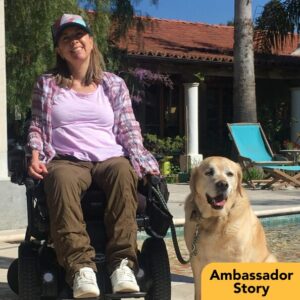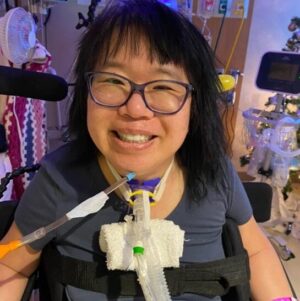Time and time again, Help Hope Live clients tell us how difficult it can be to secure life-changing mobility equipment after a catastrophic injury. To get a professional perspective, we spoke to Jeffrey M. Brandt, the founder and CEO of Ability Prosthetics & Orthotics, Inc., and Julie McCulley, a resident prosthetist orthotist. Ability P&O provides artificial limbs and braces to help patients “move freely and actively.”

How can mobility impact your life after an injury or debilitating illness?
Julie: Many times, individuals who have undergone an injury or amputation fear they may be unable to perform the basic movements that will allow them to move independently. A well-designed prosthesis can potentially allow a person to regain FULL independence and, for some people, even participate in activities they have never tried before!
Jeffrey: Devices are important, but that’s just 30% of our jobs. The rest is psychosocial: lending an ear, giving suggestions, and providing support. We offer adaptive sports events, community events, and educational opportunities in addition to physical mobility support. These elements can help individuals to re-connect with their community and begin building their lives back up again.
We aren’t social workers, but being called social workers is a compliment to our team. It’s vital for us to promote community connections and psychological satisfaction.
What’s the best way to support a friend living with an injury?

Jeffrey: First of all, listen. Prioritize communication and getting to know that individual person’s story and what they care about. Do your own research so you can help to connect the individual with compassionate and competent resource providers in his or her community.
Julie: It is important for family members and friends to attend support groups so that they can talk to others who are sharing a similar experience. Getting involved in activities and organizations like the Challenged Athletes Foundation, Adaptive Adventures, or Athletes with Disabilities will allow you to develop a community of peers with valuable insights.
What is a common misconception about life after injury that you have encountered?
Can financial concerns be a barrier to mobility?
Jeffrey: Your lifetime needs will change after an injury. Just because someone feels great today doesn’t mean that will still be the case in two years or five years. Sometimes an individual who is doing great with rehabilitation could still need more equipment or additional resources to truly make progress.
Julie: A prosthetic leg can cost anywhere from $7,000 to $50,000. This cost depends on the level of amputation and the components necessary to allow a person to reach the activity level they are striving to reach.
Jeffrey: From a patient perspective, our insurance system is broken. Insurance companies view many mainstream mobility requirements as luxuries and consequently won’t cover the cost. That may extend to physical therapy at any level, life-changing medical supplies, replacement supplies, or equipment that must be altered as an individual ages or makes mobility progress.
Some insurance plans will only pay for one prosthetic limb within a patient’s lifetime. If you are someone who relies on a prosthetic limb, you may find that you need a new limb every 6 months based on how quickly you progress with rehab or how your body grows and changes naturally over time. Under your plan, the entire cost of those new limbs would be out-of-pocket for you and your family, possibly for a lifetime.

The irony is evident in this example. Say someone with medical insurance needs a $12,000 prosthetic leg. Research has shown that if insurance companies deny coverage for that $12,000 leg, the patient will end up costing the industry $100,000 or more, because that individual is no longer able to work and therefore contribute to the overall economy.
Insurance companies are in the business of not paying out benefits whenever possible. We combat this reality by opening lines of communications to other patient resources, including organizations like Help Hope Live than can help to relieve the financial burden of out-of-pocket mobility costs.
Jeffrey is the founder and CEO of Ability Prosthetics & Orthotics, Inc. Julie, MPO, MS, ATC/L, is a resident prosthetist/orthotist at Ability Prosthetics & Orthotics in Exton, PA.
Written by Emily Progin










